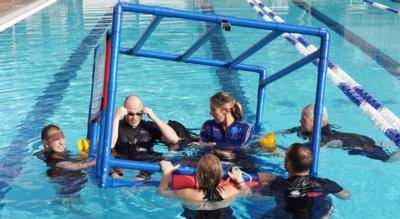Mon, Jan 23, 2017
Practice Sessions Held In Three Locations Around The Country
AeroCare Air Ambulance recently held their annual "Safety Days" training in all three base locations: Scottsdale, Chicago, and Ft. Lauderdale. Medical and flight crews, as well as members of the sales team and communication center, participated in the training which simulated an aircraft ditching in water.

The simulation was accomplished by using a specially built-training prop (simulator) made to resemble the the interior of a Learjet. The simulator was built to the specifications of one of AeroCare's existing Learjet air ambulances, right down to the exact measurements, seats, and safety belts. Crew also were provided with the standard aviation life jackets.
The simulation took place in a swimming pool at each location. Some of the crew and employees were a little apprehensive about being strapped in and flipped under water. AeroCare Aeromedical Case Manager Jennifer Elaqad, who participated, said, "It was a scary experience. I have a new-found respect for our medical crews and pilots."
AeroCare's Corporate Clinical Educator, Dave DiClementi, said, "The simulator was flipped upside down with the crew members inside. They had to maintain situational awareness and escape from the simulator through the emergency exit. Once outside of the simulator, their life jacket had to be properly worn and inflated. They then had to regroup and show proper techniques to conserve energy and maintain body temperature as a team. This training uses crew resource management during aircraft emergencies"
At AeroCare, safety is the number one priority. DiClementi said, "This training is a small part of the training exercises that we do at AeroCare regarding safety. Safety training is important to inform our crews of the inherent risk of this type of work and to ensure their success if faced with a survival situation. The more prepared our crews are in safety and survival, the more successful they will be for themselves as well as for our customers. Crew members have a better understanding of their own limitations and fears. From a management perspective we gain an understanding of weaknesses which can help us better staff our flights so that our crew members can complement weakness with strengths."
(Image provided with AeroCare news release)
More News
Terminal Radar Service Area Airspace surrounding designated airports wherein ATC provides radar vectoring, sequencing, and separation on a full-time basis for all IFR and participa>[...]
Very High Frequency (VHF) The frequency band between 30 and 300 MHz. Portions of this band, 108 to 118 MHz, are used for certain NAVAIDs; 118 to 136 MHz are used for civil air/grou>[...]
“From approximately November 2021 through January 2022, Britton-Harr, acting on behalf of AeroVanti, entered into lease-purchase agreements for five Piaggio-manufactured airc>[...]
Also: Virtual FLRAA Prototype, IFR-Capable Autonomous A/C, NS-32 Crew, Golden Dome Missile Defense Bombardier announced that the first production Global 8000 successfully completed>[...]
Aero Linx: The 1-26 Association (Schweizer) The Association’s goal is to foster the helpfulness, the camaraderie, and the opportunity for head-to-head competition that is fou>[...]
 ANN's Daily Aero-Term (05.29.25): Terminal Radar Service Area
ANN's Daily Aero-Term (05.29.25): Terminal Radar Service Area ANN's Daily Aero-Term (05.30.25): Very High Frequency (VHF)
ANN's Daily Aero-Term (05.30.25): Very High Frequency (VHF) Aero-News: Quote of the Day (05.30.25)
Aero-News: Quote of the Day (05.30.25) Airborne 05.23.25: Global 8000, Qatar B747 Accepted, Aviation Merit Badge
Airborne 05.23.25: Global 8000, Qatar B747 Accepted, Aviation Merit Badge ANN's Daily Aero-Linx (05.30.25)
ANN's Daily Aero-Linx (05.30.25)



